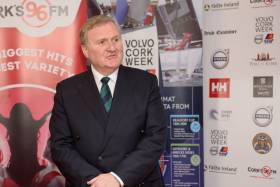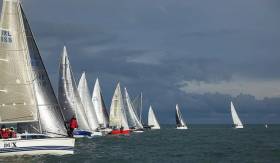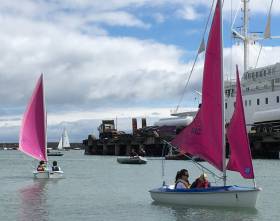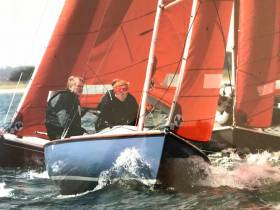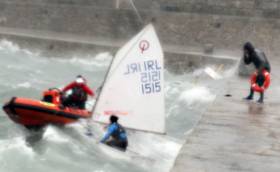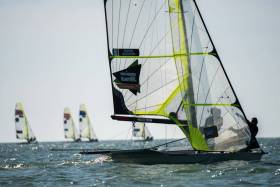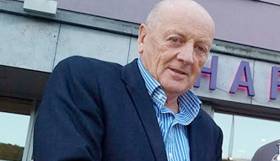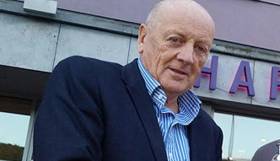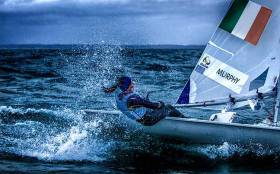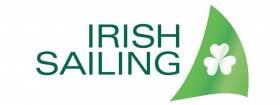Displaying items by tag: Irish Sailing
Irish Sailing’s Harmonious AGM Reflects Work Done, Successes Achieved, & Remarkable Contribution of President
Time was when Annual General Meetings were well-attended events with opportunities for the highlighting of grievances among the membership, and even – in the distant past – the possibility of a vigorous and sometimes heated debate writes W M Nixon.
But with today’s 24/7 communications across the sailing media, and the rapid compartmentalisation of problems as they have arisen through the year into quickly-established and recognised solution structures with accepted methods of procedure, contemporary AGMs have become smoothly-choreographed and businesslike meetings which review a wide range of topics in a short space of time, thanks to a specialised attendance which is already well-briefed on the matters in hand.
But despite the impersonal nature of the raft of skillfully-collated data which the attendance will have readily to hand, national sporting bodies are ultimately all about people. And last Saturday’s Annual General Meeting of Irish Sailing in the hospitable National Yacht Club in Dun Laoghaire had its positive tone set by the friendly personality, style and enthusiasm of President Jack Roy, now energetically into his second year of the three year term as President.
That said, it was a modestly-attended event, even if many of the key people in the Irish sailing scene were there. But my own feeling was that our President has thrown himself into his voluntary task with such effective interest and enjoyment that many of his members feel sure that, if they haven’t done so already, they are pretty certain to meet him soon at some of the many events he attends in one or other of his many capacities, for he is also a noted Race Officer, while he relishes the individuality of Ireland’s widely-varied sailing clubs, and is keen to visit as many of them as possible in both a personal and Presidential role.
Jack Roy was also very much in evidence on stage in the RDS just over four weeks ago for the annual Volvo/Irish Sailing/Afloat.ie Sailing Awards. That event was attended by more than 440 people, so numerically it not only completely eclipses any other sailing gathering by a wide margin, but it is sailing’s main social gathering, whereas the AGM is strictly business.
The too, since the Awards, we’ve not only had the well-attended Irish Sailing/CAI Annual Cruising Conference, but the new “Sailor of the Year” Conor Fogerty has won his first major of 2018 within a fortnight of receiving his accolade. And on the weekend of the AGM, sailing was taking place with the Inter-Varsities in Kilrush, the popular PY1000 race at Royal Cork, and several other smaller events scheduled at other centres.
In other words, 2018’s sailing itself is now taking centre stage. But those who were at the AGM came from several parts of the country while reflecting all interests, and with a high turnout of top officers it was a chance for some post-AGM networking on topics of mutual interest. As for the meeting itself, the core was the Presidential Report and the Financial Statement, (downloadable below) while the extra contribution was by Neil Murphy, who headed the vital Strategic Review of three years ago. Having seen many of his proposals implemented, he was pleased to report that the number of people using the various introductory courses to sailing was increasing, and that now that they had a handle on the figures, the time and resources-consuming business of making an annual survey of the clubs would become a biennial project.
The AGM tried to give an overall picture of an organisation of great diversity. Whether we like it or not, the success of the High Performance Divisions is key to fund-raising from Sports Ireland, while recognized international racing success is also central to the continung development of the fund-raising activities of the Irish Sailing Foundation. Yet this level of sailing is far indeed from the activities of your ordinary club racer, and much of its work is organised by highly specialised semi-autonomous sub-groups.
Trying to include them all in a comprehensible overall picture which reflects Irish Sailing in all its diversity is a challenge. But the abiding impression of Saturday’s AGM was that our President has put his enthusiasm and energy into the task of serving all Irish sailing with his customary dedication and enjoyment. Irish Sailing is in good hands.
New Date For 2018 Race Officials Conference
#IrishSailing - The Irish Sailing Race Officials Conference for 2018, originally set for this past weekend, has been rescheduled for next month on Sunday 15 April.
Irish Sailing made the decision on Friday (2 March) on account of the extreme weather event across Ireland in recent days.
The venue remains the Plaza Hotel in Tallaght, and places can be booked on the Irish Sailing website for anyone interested in racing, whether practising or aspiring race officials, committee boat volunteers and others.
Fourteen speakers will be travelling from the UK and around Ireland for the conference, which will feature presentations on weather forecasting, tides, race communications and management, and much more.
For more details visit the Irish Sailing website HERE.
Meanwhile, Irish Sailing’s 2018 AGM proceeds as planned at the National Yacht Club this coming Saturday 10 March.
The Watersports Inclusion Games at Dun Laoghaire Harbour last summer have made the shortlist of nominees for the 2018 Irish Sport Industry Awards.
Hosted by Irish Sailing at the Royal St George Yacht Club in late June, the inaugural event for sailors of various abilities on the physical, sensory, intellectual and learning difficulty spectrums attracted over 220 participants plus their families and volunteers to try sailing, rowing and paddling.
All those taking part gave enthusiastic feedback about the weekend, which aimed to demonstrate to participants and service providers alike that watersport is accessible to all.
The games are in the running for the Sporting Innovation of the Year Award alongside Rowing Ireland’s ‘Get Going, Get Rowing’ campaign.
Winners will be announced at the Irish Sport Industry Awards in association with JLT Ireland in Dublin’s Smock Alley Theatre next Wednesday 7 March.
The Annual General Meeting of the Irish Sailing Association will be held at the National Yacht Club at 1100 hrs on 10th March 2017.
The AGM will be immediately followed by a Commodores Forum chaired by Irish Sailing President Jack Roy, for Club commodores.
The President of the Board is elected annually in accordance with article 57.
Directors Paddy McGlade, Sarah Byrne & Brian Craig having been longest in office since their last election are retiring by rotation in accordance with article 64, and have been nominated by the Irish Sailing Board for re-election in accordance with article 62.
Download the full notice and agenda below.
Optimist Squad Incident Report Criticises Irish Sailing Coaching Systems – Full Report Here
#Optimist - An independent report into an incident involving Irish Sailing’s junior Optimist squad last year, during which almost half the dinghy fleet sustained significant damage, has criticised the organisation’s coaching systems.
Scroll down the page to download the full report.
The review of the October 2017 incident in Dun Laoghaire Harbour, in which seven sailors were forced to abandon their dinghies in high winds while the lead coach’s RIB lost engine power, found that appropriate preparations had not been put in place for the coaching session.
However, the report defended the coach’s decision to launch the junior fleet as a storm approached, finding that he acted “in good faith” and that he believed a two-hour sailing session was possible.
The report’s criticisms focus on the structure behind the sailing programme, finding that “appropriate equipment, resources and facilities were not provided”. Both the lead and assistant coaches had not met until the morning of the training session, were unfamiliar with their RIBs and launched without VHF radio communications.
Early into the coaching session, winds changed direction and gusts increased in strength. Some of the sailors began to experience difficulties as conditions worsened, so it was decided to abandon the coaching session.
Nine of the squad members returned to shore under their own sail power. However, the remainder of the fleet, in a more open leeward position, got caught in unusually high and confused wave patterns near the East Pier. These seven junior sailors were forced to abandon their dinghies, which eventually sustained significant damaged from impact against the pier wall.
By the time the incident escalated to emergency proportions, the lead coach’s RIB was disabled by a fuel-related engine failure and was drifting towards the East Pier wall. The report applauded the actions of the assistant coach who assumed charge and rescued four sailors from the water.
The review found that the Optimist Squad programme was established without “any obvious or adequately structured project management approach” and that there was “a lack of clarity” as to who was responsible for preparing the coaching session.
This in turn led to “hasty and incomplete preparations”, which failed to provide the coaches with a proper induction and failed to provide “the essential resources, facilities and equipment needed” for the coaching session.
The review recommended a “top-down internal review” of the management of performance coaching programmes. It noted that there was “a complete lack of clarity as to who was directly responsible for making and ensuring that adequate practical preparation was made” for the coaching session, adding that “in such circumstances, balance of judgement must swing toward failures of processes and systems which ought to have been in place, rather than on the actions, or omissions, of any of those individuals directly involved.”
Speaking ahead of the publication of the report, at last Friday's Irish Sailing Awards where he gave the opening address, Irish Sailing President Jack Roy said: “As an adventure sport, sailing has its inherent risks. We know this every time we go afloat. We also know we have a duty to protect ourselves and others."
Roy was referring to two heroic rescues that were saluted on the night but he also used the opportunity to tell the gathering that one of the outcomes from the Optimist Incident report includes "a rigorous overhaul of the association’s own safety guidelines that will be extended to all clubs and classes".
On publication of the report today, Roy told Afloat.ie: "Irish Sailing fully supports the outcomes of the report and have appointed a working group to consider the recommendations, assess how best Irish Sailing can address them, and help with the implementation.
"This group has already begun work on the recommendations and are aiming for initial outcomes to be completed by 31st March 2018."
The full report and the executive summary is downloadable below.
Performance Sailing Gets €735K From Sport Ireland For 2018
#IrishSailing - Irish Sailing has received the second-highest allocation from Sport Ireland for High Performance Programmes in 2018.
On Thursday 1 February, Sport Minister Brendan Griffin announced this year’s around of investment for 2018, which sees Ireland’s national governing body for sailing get €735,000 for high performance projects — second only to Athletics Ireland at €790,000 — on the eve of the first qualifiers for the 2020 Olympic Games in Tokyo.
Irish Sailing also receives €323,000 in core funding under the €10.8 million investment package for National Governing Bodies for Sport, and €18,000 under the Women in Sport programme.
Commenting on the high performance grant, Irish Sailing performance director James O’Callaghan said: “It is a fantastic endorsement of our sport and reflects the efforts put in by our sailors, coaches and clubs throughout the country into the performance pathway.
“Despite the generous support, the pathway still faces challenges to deliver a world class programme from junior to Olympic classes.
“2018 is Olympic qualifying year which is a huge milestone in the quadrennial. Our next challenge is to secure additional funding for capital equipment.
O’Callaghan added: “The Irish Sailing Foundation, set up to bridge the financial gap, was a big contributor to the programme in 2017 and it is hoped this will grow further in 2018 enabling continued success.”
Other aquatic sporting bodies benefitting from this year’s funding package include Rowing Ireland, with €210,000 in core funding, €525,000 under the High Performance programme and €45,000 under Women in Sport; and Canoeing Ireland, which receives €205,000 in core funding and €40,000 under High Performance.
The Irish Surfing Association gets €64,000 to match its core funding in 2017, plus €7,000 under Women in Sport, while the Irish Underwater Council, which governs diving and other subaquatic sports, receives €60,000 in core funding.
Meanwhile, the Irish Waterski & Wakeboard Federation gets €20,000 core funding, and the Angling Council of Ireland receives €10,000 core funding plus €4,000 under Women in Sport.
These grants are in addition the funding allocated under the 2017 Sports Capital Programme for local projects and regional developments that were announced in November and December respectively.
Nobby Reilly Details Decision To Resign From ICRA
#ICRA - Norbert ‘Nobby’ Reilly has spoken to Afloat.ie to clarify his comments over his resignation from the Irish Cruiser Racing Association (ICRA) last week.
As previously reported on Afloat.ie, the Howth Yacht Club sailor and former ICRA commodore left the organisation on the eve of a crucial symposium at the weekend to decide its future, citing disagreements with its direction over the previous year.
Among these were claims that little of its funding boost since signing a memorandum of understanding with Irish Sailing went to new training programmes or recruitment of new members.
Reilly also referred to the decision to make Galway the host venue of the 2018 ICRA Nationals was not passed by the executive, and that the first he learned of it “was on Facebook”.
Commenting to Afloat.ie on Friday, IRCA commodore Simon McGibney said that Reilly had been given a fair hearing regarding his complains, adding that decisions “are always done by majority”.
But Reilly has hit back at assertions that there is “democracy” in the organisation, claiming that no minutes of meeting have been produced where Galway was agreed as this year’s venue.
Following the announcement, Reilly says there was “a storm of protests” from Dublin-based cruiser racers.
A survey was sent out to all members to gauge whether or not they sailed in the 2017 ICRA Nationals at the Royal Cork, the results of which have yet to be officially published.
“All summer ICRA received emails and calls protesting about Galway,” adds Reilly. “I requested that same be made available to [the] ICRA exec but reply received [was] “These were personal to the commodore.’”
Reilly says there was a push within the organisation for an EGM to review the danger of becoming irrelevant to the Dublin fleet, which constitutes the majority of IRCA’s membership.
Instead, a full executive meet was arranged, but Reilly claims that its members had not all been made aware of the complains from the Dublin membership, and that the resulting meeting only saw 50% attendance.
Reilly says his pitch to the executive that IRCA talk with Galway with a view to keeping Dublin as a host venue for the 2018 calendar was voted down — and he was further shot down over his request that Dublin keep a slot by running an East Coast IRC.
“The exec in ICRA is just irrelevant,” adds Reilly on his decision to resign. “Recently two new members [were] added with no discussion or prior notice.”
Norbert Reilly Resigns From ICRA On Eve Of Crucial Symposium
#ICRA - Norbert 'Nobby' Reilly has resigned from the Irish Cruiser Racing Association (ICRA) over disagreements with its direction in the last 12 months.
In his resignation letter submitted yesterday (Thursday 18 January), the Howth Yacht Club stalwart and former ICRA commodore suggested that it is “probably a good time to wind up” the association, on the eve of a symposium to determine its future direction.
Reilly accused ICRA of “getting in the way of its own plan” since a memorandum of understanding signed in 2016 with the ISA, now Irish Sailing, led to a boost in its finances for cultivating and promoting cruiser racing in Ireland.
Of its €50,000 budget for 2017 — four times ICRA’s revenue in 2015 — allocations of €11,000 were made for training and €8,500 for recruitment via CrewPoint.
But Reilly claims only €2,000 of the former was spent in clubs (Howth YC and the Royal Cork) which already have training programmes in place, with little spend or results for the latter.
Fixture clashes, disputes over venue selection, a drop in crew numbers and a poor return from its communications/web and social media budget are some of the other issues cited by Reilly in influencing his decision.
Specifically, Reilly says that the selection of Galway as host venue of this year's ICRA Nationals was not passed by the executive, and that the first he knew of the decision “was on Facebook”.
Speaking to Afloat.ie on Reilly’s resignation, ICRA commodore Simon McGibney paid tribute to his contributions to cruiser racing, but added that the departing executive’s comments should not affect plans for the weekend symposium, which starts tomorrow morning in Limerick.
“Strategically what we’re trying to do is to take a good look and review where we [as ICRA] want to see ourselves in the next five years, and that has always been the case going forward.”
McGibney added that he believes Reilly was given a fair hearing from the ICRA board, but decisions “are always done by majority”.
Regarding the ICRA Nationals in Galway this August, McGibney dismisses suggestions that the event would not be a ‘true nationals’ without the presence of Dublin boats because “there is a rotation of where the Nationals will be hosted” as bound by the ICRA constitution.
“Galway is an ideal location to bring it to the West Coast,” he added, urging people to “look at the bigger picture” of the event as “a promotion for cruiser racing on a national level.”
Has There Been an 'Annalise Effect' in Irish Sailing?
With every great win comes a ripple effect. Annalise Murphy’s silver medal in sailing at the Rio Olympics in 2016 was good news for the country, for sport, and the sailing community in general. But how has the bounce been felt one year on?
President of Irish Sailing, Jack Roy commented “it’s interesting to look at the figures to see what impact, if any, Annalise’s medal has had on increasing awareness of sailing or attracting new people to our sport. We know that Olympic medals increase people’s enthusiasm for trying out a new sport, boxing and rowing being prime examples and it appears from our figures at the end of 2017 that there certainly has been a very positive effect that can be attributed to Annalise’s success in Rio”
More people sailing
As you’d expect, there’s been a bounce in the number of people sailing around the country. The Irish Sailing’s “Try Sailing” programme which encourages clubs and training centres to create opportunities and events for new sailors, saw a distinct rise this summer, with 5,816 people attending events. That’s a 61% increase on the 2016 numbers. Interestingly half of the sailors were female, and 57% were under 18. There’s an anticipated boost to club membership too of about 5%, but these figures won’t be concrete until the end of 2018.
But there are other ways in which the Annalise effect can be seen.
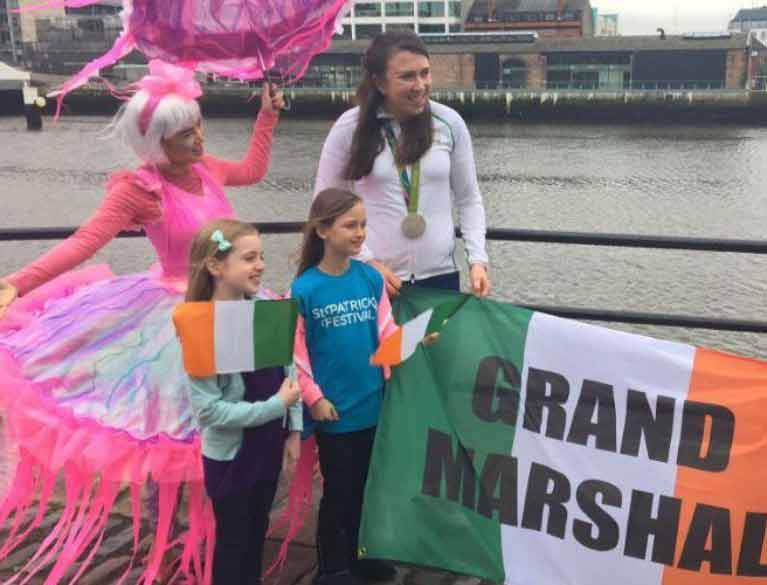 Annalise Murphy prepares for her St. Patrick's Day Parade role
Annalise Murphy prepares for her St. Patrick's Day Parade role
Ambassador role
Annalise has played an ambassador role for sailing since her win. She’s been out and about, visiting her old schools, Grand Marshalling the St Patrick’s Day parade, appearing on TV, radio and podcasts, and working with Irish Sailing and Dun Laoghaire Rathdown County Council visiting school children. All of which raise the profile of sailing and encourage a non-traditional audience to get out onto the water.
Third level recognise high-performance sailors
Some of the main universities, as a direct result of the Olympic medal and the corresponding increased awareness of sailing, have reassessed the way they view high performance athletes, and are allowing them to lengthen their degree programmes and award scholarships. For the Irish Sailing Performance Pathway athletes, this is a huge boost. By extending degree programmes, athletes can dedicate more time to their sporting careers whilst balancing that with the need to accomplish other life and career goals. UCD recently awarded Liam Glynn an Ad Astra scholarship. UCC have given three scholarships to Fionn Lyden, Seafra Guilfoyle and Mark Hassett. UCC also support Johnny Durcan on a pre-university programme which offers access to sports services and facilities. Aisling Keller, Aoife Hopkins and Sean Donnelly received sports scholarships from Trinity College Dublin this week.
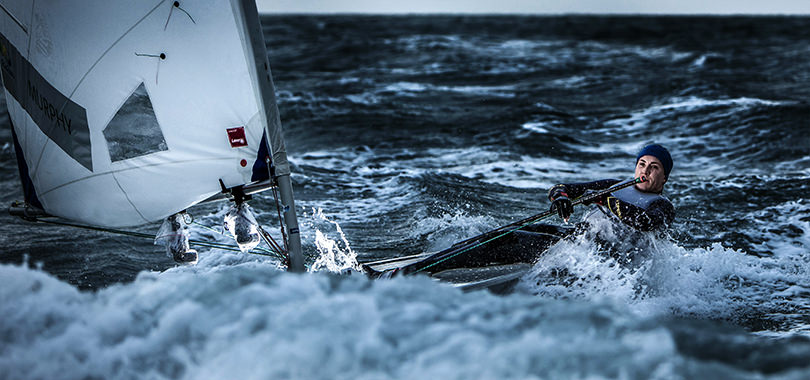 Annalise at full stretch on Dublin Bay. Photo: Terry McDonagh
Annalise at full stretch on Dublin Bay. Photo: Terry McDonagh
Young women in sailing given a boost
And what about the young women who are competing competitively in sailing – what effect did Annalise’s win have on them ? Annalise has been very open in saying that she felt she had limited natural talent, putting her success down to hard work and determination.
For Hannah Leonard, a Transition Year student who sails Optimists out of the Royal Irish Yacht Club in Dublin, Annalise’s achievement had a big impact. “I’ve often thought about giving up [sailing], but Annalise wasn’t good in an Optimist and it gives me hope that I could be better in a different boat like the Laser”.
For Ella May, a Laser sailor aged 16, the win has given her a boost: “when you see how close it is to home, it becomes real. When you see someone who trains where you train and come up through the ranks like you do, and experiencing what you do, I feel there’s more hope”.
For Michele Halpany who runs the 420 Class and also the junior sailors at the National Yacht Club in Dublin, Annalise is a great role model for the girls. “She’s friendly and down to earth, and it gives them a boost when they see her and chat to her. For her, the win “reinforces that girls can do just as well [in sailing]. It’s a level playing field”.
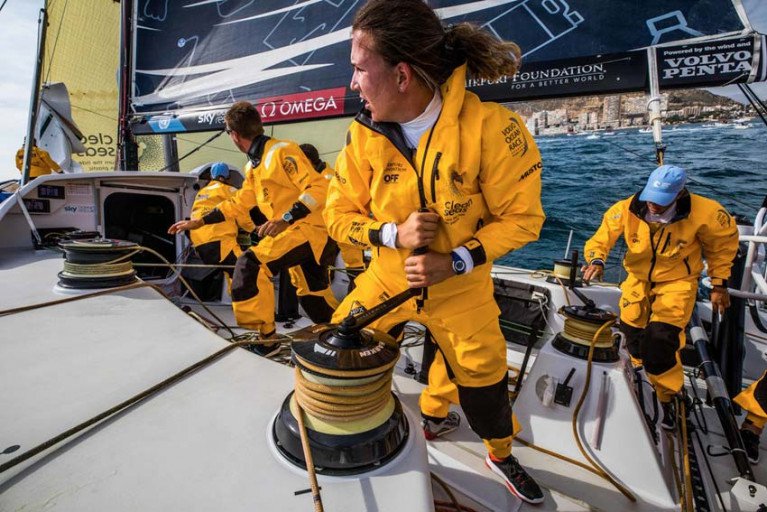 On deck with the hard-working crew of Turn The Tide on Plastic — among them Annalise Murphy — at the Leg 1 start in Alicante Photo: Jen Edney/Volvo Ocean Race
On deck with the hard-working crew of Turn The Tide on Plastic — among them Annalise Murphy — at the Leg 1 start in Alicante Photo: Jen Edney/Volvo Ocean Race
A career in sailing
So if she is responsible for a bounce in people trying sailing this year, Annalise isn’t standing still. Her switch to off-shore sailing in the Volvo Ocean Race shows there’s life beyond the Olympics and that a career in sailing is possible.
If you’re interested in getting out onto the water but don’t know where to start, check out trysailing.ie
Irish Sailing Publishes 2018 & 2019 Tide Times
#Tides - Irish Sailing has published the latest tide times for 2018 and 2019 for mariners in Dublin Bay (North Wall), Galway, Belfast and Cork Harbour (Cobh).
All times and related tidal variations (adjusted for Irish Summer Time) are estimates and none are verified by any national hydrographic office, so are to be referred to as a guideline only.


























